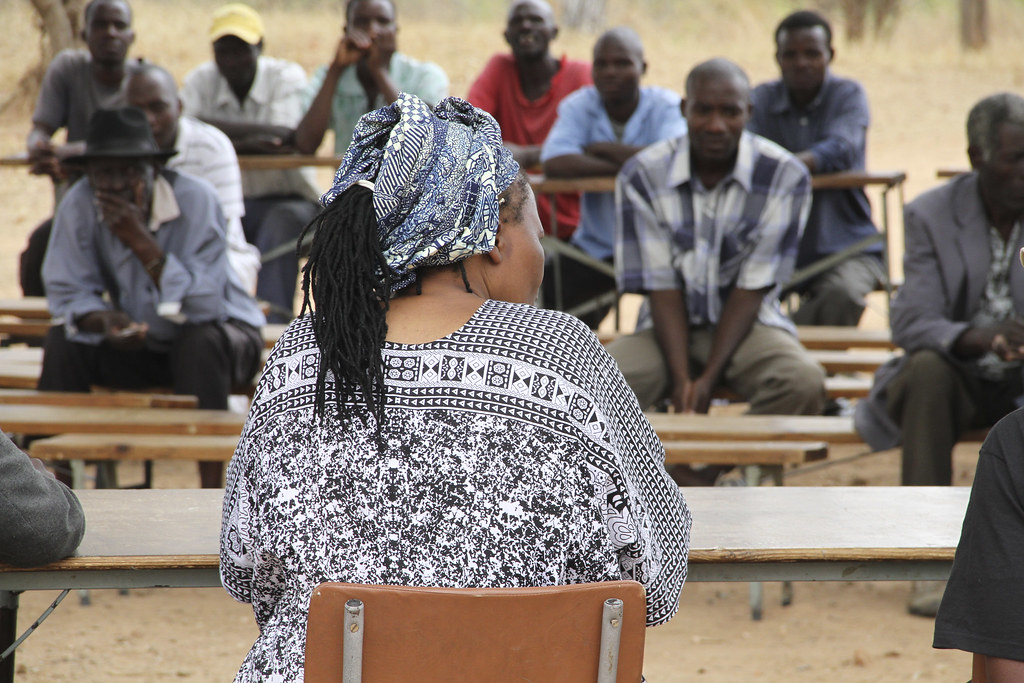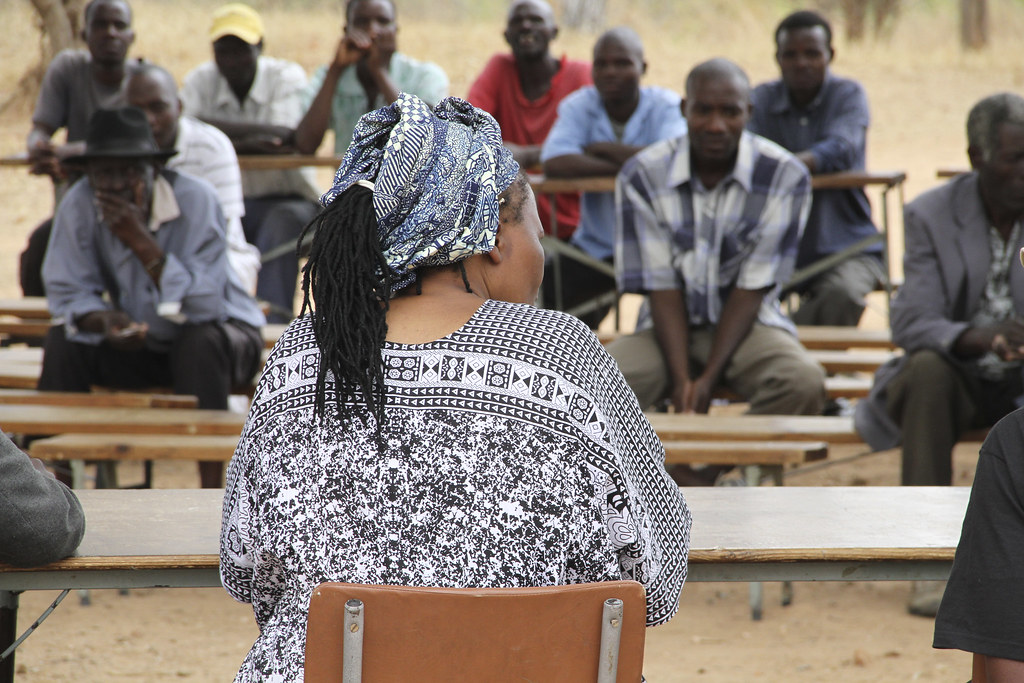

Carbon credit projects may make profits for a Dubai-based firm, but experts and locals are sceptical about benefits to communities and the climate.

Growing scrutiny of carbon credit projects of the sort that will skyrocket in Zimbabwe under a deal with a UAE-based firm has found meagre benefits for local communities. Credit: Tsvangirayi Mukwazhi
On 29 September, Zimbabwe granted a UAE-based firm conservation rights over 7.5 million hectares of its forests – about 20% of the country’s landmass. Under the deal, touted to be worth $1.5 billion, Blue Carbon General Trading will run forest preservation projects that will generate carbon credits to be sold on the global market.
At the signing ceremony in Harare, Ahmed Dalmook Al Maktoum, a member of Dubai’s royal family and chair of Blue Carbon, promised that the deal “will bring hundreds of millions of dollars to the Zimbabwean government”. A company statement later said the parties were “embarking on a transformative endeavour dedicated to the advancement of environmental conservation, the well-being of local communities, and the stimulation of economic growth”.
Under the deal, the UAE company will receive 70% of revenues from the selling of carbon credits. The remaining 30% will go to the Zimbabwean government, of which 55% will be passed on to local communities.
This share follows the government’s decision earlier this year to cancel all carbon credit projects in the country and demand a higher revenue allocation. It initially insisted that 50% of earnings from offsetting schemes go to the treasury, before softening its stance to 30%.
Beyond these initial announcements, no further detail about the deal has been made available. Neither Blue Carbon nor Zimbabwe’s Environment Ministry responded to requests for more information and campaigners have said the deal is opaque. The Dubai-based firm was established a year ago and has no experience of developing carbon offset projects.
Win-win?
Carbon credit schemes work by creating projects that either reduce emissions of carbon or capture it from the air. These bypassed emissions can be turned into internationally tradeable carbon credits. These arrangements, in theory, enable a win-win: they allow local communities and governments to generate income for conservation projects; meanwhile companies get to “offset” their carbon footprints by investing in these environmental schemes.
Scrutiny of carbon credit schemes, however, has brought both sides of this hypothetical win-win into question. For instance, a recent investigation into Zimbabwe’s Kariba mega-project – one of the largest carbon offsetting schemes in the world – found that the company behind it, South Pole, could not be sure that tens of millions of dollars intended for local communities had ever reached them. It was this exposé that prompted the Zimbabwean government to void all carbon offsetting schemes and change its policy.
Some climate experts say local communities have not been consulted on the UAE deal and argue that the new revenue share is still too generous to foreign corporations.
“Why is it that 70% of what we hold goes to an investor and not to the community that has strived for years to protect that forest?” asks Sydney Chisi, executive director of the Zimbabwean climate and social justice organisation Reyna Trust. It is still unclear, he says, “whether carbon credits will benefit the communities or not”.
Research has also challenged the notion that carbon offsetting schemes genuinely reduce carbon emissions. Numerous reports have found deep flaws in projects, with one investigation concluding that 90% of forest carbon offsets approved by the world’s leading certifier are worthless or could even make global heating worse.
Zimbabwe, with 30 active carbon offsetting projects, is already the third largest source of carbon credits in Africa and the 12th largest in the world. Despite these initiatives, its forest cover has continued to deplete at an alarming rate. From 2001 in 2022, the country lost 16% of its tree cover, according to Global Forest Watch. The Zimbabwe Forestry Commission estimates that the country loses 262,000 hectares – about 400,000 football pitches – of forest each year.
No silver bullet
Zimbabwe’s forest has depleted for numerous reasons, many of them social and economic. In many instances, cutting trees is essential to people’s livelihoods.
Around 2 million Zimbabweans, for instance, are estimated to rely on tobacco farming. This industry continues to grow and is central to the country’s economy, bringing in about $1 billion in export earnings each year. Zimbabwe is the largest tobacco grower in Africa and the fourth largest in the world. It takes 30kg of firewood to cure just 1kg of tobacco.
Firewood and charcoal sellers also rely on clearing forests for their livelihoods. In a country in which millions of people use fuelwood for energy, especially amid extended power cuts, this is also big business.
As these examples show, deforestation is far from simple. Instead, it is a highly complex issue that intersects with many of Zimbabwe’s other challenges. Any carbon offsetting scheme will have to contend with these interconnected drivers around livelihoods, infrastructure, energy generation, and more.
Given the difficulty of addressing these problems and past policy failures, many sellers in the industries that rely on clearing trees seem unfazed by Zimbabwe’s new deal with the UAE company.
“We have heard worse threats before, but nothing happens,” says Obert Tinarwo, a charcoal seller for the past 15 years. “No one can stop us from this business.”
“We will only stop this trade if someone gives us formal jobs,” adds Fanuel Shadaya, a firewood dealer.
Forestry Commission spokesperson Violet Makoto reiterates the difficulties of combatting deforestation and emphasises that there is no silver bullet.
“The Forestry Commission and other key stakeholders conduct regular blitzes and increase surveillance…but the challenge has been exacerbated by increased demand in fuelwood energy across the country and load shedding among other drivers,” she says. “The challenge is cross-sectoral and can only be eradicated through a holistic approach.”
A false solution to begin with?
Many governments, environmental NGOs, and companies believe in the potential of carbon credits to mitigate climate change, generate income, and solve problems like Zimbabwe’s rapid deforestation. Carbon markets were one of the key focuses at the inaugural Africa Climate Summit held in Kenya this September, at which President William Ruto described African carbon sinks as an “unparalleled economic goldmine”. The voluntary carbon market quadrupled in size to reach $2 billion in 2021 and is predicted to be worth up to $50 billion by 2030.
At the same time, however, a growing number of experts are increasingly sceptical that carbon offsetting schemes will benefit the climate and communities – though their potential to generate profits for investors are less in doubt.
“In our view, companies are seeking an economic goldmine for themselves,” says Audrey Gaughran, executive director of Centre for Research on Multinational Corporations (SOMO). “Carbon offsetting is an industry; it is not primarily about conservation. It is about extracting wealth from the environment.”
Gaughran points out that offsetting has been particularly controversial in Latin America, where indigenous peoples and marginalised communities have lost their land and seen their livelihoods made all but illegal so a multinational carbon trading company can make money.
“Once a company, and usually it is a foreign company, can make a profit from controlling large land areas, the main beneficiary is likely to be the company,” she says. “Not the people. Not the country. But the foreign owners or shareholders.”
Fasanya Benson Dotun from the Africa Climate Justice Collective (ACJC) puts it more simply. “Carbon trading or offsetting is part of the false solutions perpetrated by the global corporations to further promote fossil fuel and other extractives,” he says.
With no further details forthcoming, it may be too early to assess the exact impact of Zimbabwe offering the UAE-based company rights over 20% of its landmass. What does seem likely is that both large-scale African carbon offsetting schemes – and scrutiny of them – is set to increase.
This article by Zimbabwean freelance journalist Cyril Zenda was first published in African Arguments on 31st October 2023. 
Articles on African Arguments are licensed under a Creative Commons Attribution-NonCommercial-ShareAlike 4.0 International License.
Source
Language of the news reported
Related content:
Copyright © Source (mentioned above). All rights reserved. The Land Portal distributes materials without the copyright owner’s permission based on the “fair use” doctrine of copyright, meaning that we post news articles for non-commercial, informative purposes. If you are the owner of the article or report and would like it to be removed, please contact us at hello@landportal.info and we will remove the posting immediately.
Various news items related to land governance are posted on the Land Portal every day by the Land Portal users, from various sources, such as news organizations and other institutions and individuals, representing a diversity of positions on every topic. The copyright lies with the source of the article; the Land Portal Foundation does not have the legal right to edit or correct the article, nor does the Foundation endorse its content. To make corrections or ask for permission to republish or other authorized use of this material, please contact the copyright holder.
